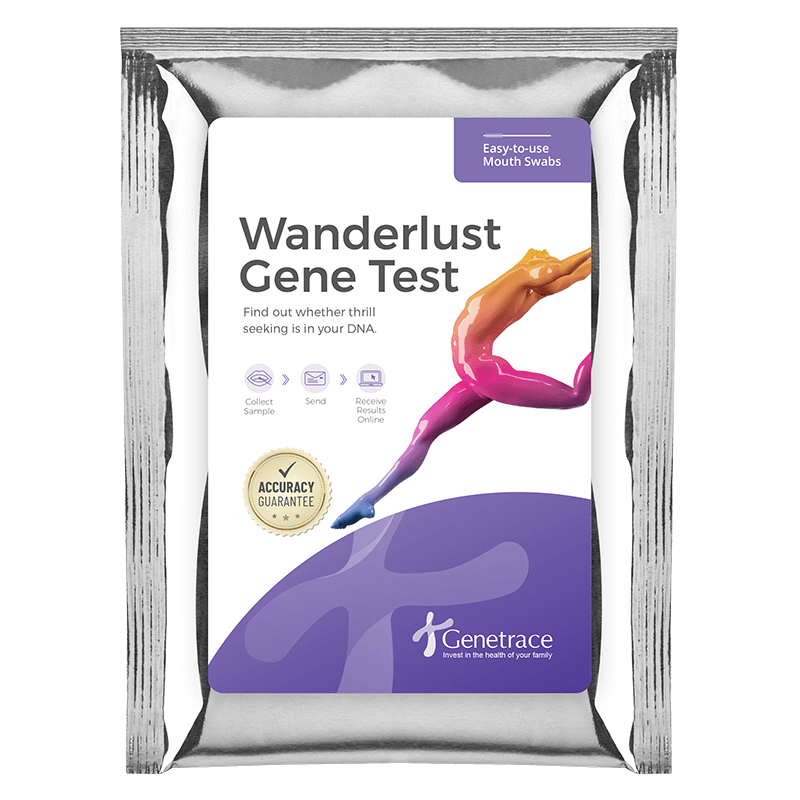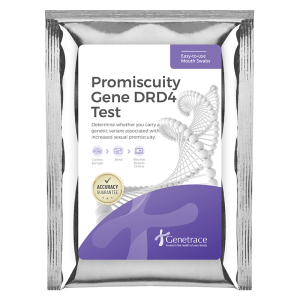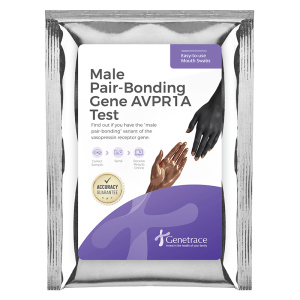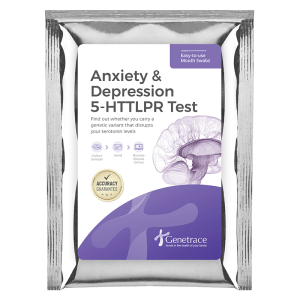Wanderlust Gene Test
$149.00
Do you love adventure, travelling and discovering new places? You may be one of those people with the “wanderlust” gene. Find out whether thrill seeking is in your DNA.
- Detects the “wanderlust” variant in the DRD4 gene
- People who inherit at least one variant with 7 or more repeats (7R+) are more likely to travel often, take risks, explore new places, try new food and be sexually adventurous
- Free shipping both ways
- Easy-to-use cheek swabs
- AABB, ISO17025 & CLIA accredited lab
Kit includes all lab fees and free return shipping to the lab.
Receive secure, confidential results through your online dashboard.
All tests performed in our AABB, ISO 17025 & CLIA accredited laboratory.
The “wanderlust” gene is a genetic variation of the DRD4 gene that is associated with higher likelihood of experiencing novelty-seeking behavior, such as a desire to travel and explore new places. Individuals with the “wanderlust” variant are more likely to have a strong desire to explore and more open to new experiences.
The DRD4 gene encodes the dopamine receptor D4, which binds dopamine (chemical messenger in the brain) and transmits its signal in the brain. This interaction is responsible for giving us the feelings of reward and pleasure. Individuals with the “wanderlust” gene produce a receptor that does not bind dopamine effectively and are less sensitive to dopamine. As a result, they need higher levels of dopamine to achieve the feel-good effects.
How common is the “wanderlust” gene?
The prevalence of the “wanderlust” gene varies depending on the population being studied. It is estimated that 20-30% of people around the globe carry this variant.
It is hypothesized that the “wanderlust” gene may have been key to our ancestors moving out of Africa and exploring the work to populate it. Studies show a link between the “wanderlust” gene and historical migrations supporting this hypothesis.
The “wanderlust” gene variant occurs in a region of the DRD4 gene that is repeated between 2 to 11 times. The 7R+ version or having more than 7 repeats is associated with wanderlust. Studies also show that the 7R+ allele is more prevalent in migratory populations such as the Mayans compared to populations that were more sedentary.
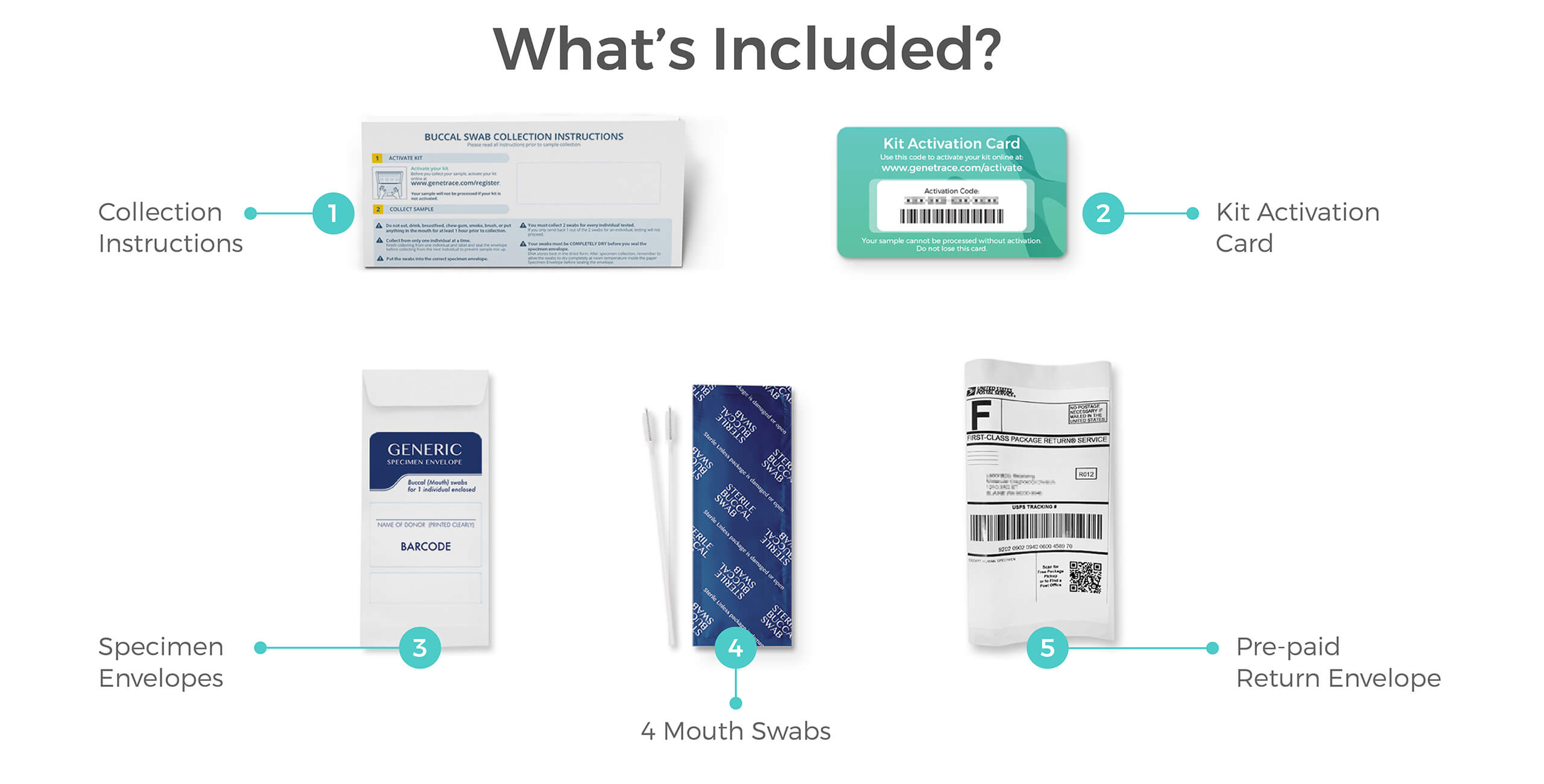
The “wanderlust” gene is a genetic variation of the DRD4 gene that is associated with higher likelihood of experiencing novelty-seeking behavior, such as a desire to travel and explore new places. Individuals with the “wanderlust” variant are more likely to have a strong desire to explore and more open to new experiences.
The DRD4 gene encodes the dopamine receptor D4, which binds dopamine (chemical messenger in the brain) and transmits its signal in the brain. This interaction is responsible for giving us the feelings of reward and pleasure. Individuals with the “wanderlust” gene produce a receptor that does not bind dopamine effectively and are less sensitive to dopamine. As a result, they need higher levels of dopamine to achieve the feel-good effects.
How common is the “wanderlust” gene?
The prevalence of the “wanderlust” gene varies depending on the population being studied. It is estimated that 20-30% of people around the globe carry this variant.
It is hypothesized that the “wanderlust” gene may have been key to our ancestors moving out of Africa and exploring the work to populate it. Studies show a link between the “wanderlust” gene and historical migrations supporting this hypothesis.
The “wanderlust” gene variant occurs in a region of the DRD4 gene that is repeated between 2 to 11 times. The 7R+ version or having more than 7 repeats is associated with wanderlust. Studies also show that the 7R+ allele is more prevalent in migratory populations such as the Mayans compared to populations that were more sedentary.
Everything you need is included in the kit, no lab fees!
Your kit contains all the supplies you need to collect an easy mouth swab DNA sample and send it in to the laboratory for testing. The kit includes free shipping both ways. All lab fees are included.
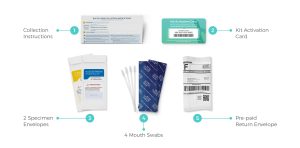
Simple Sample Collection
Secure Online Results
Accredited Laboratory
Discreet & Confidential
How it works
Purchase your kit
Your kit will be delivered to your doorstep within days with free nationwide shipping.
Collect DNA samples
Your test kit includes everything you need to collect painless mouth swab samples in the privacy of your own home.
Mail samples to the lab
When you’re finished collecting your DNA samples, simply mail them to the lab using the prepaid shipping envelope.
Receive your results
Receive confidential results in your secure online portal the moment that testing is completed.

Your kit will be delivered to your doorstep within days with free nationwide shipping.
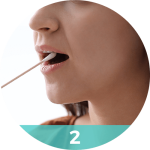
Your test kit includes everything you need to collect painless mouth swab samples in the privacy of your own home.
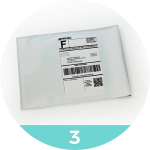
When you’re finished collecting your DNA samples, simply mail them to the lab using the prepaid shipping envelope.
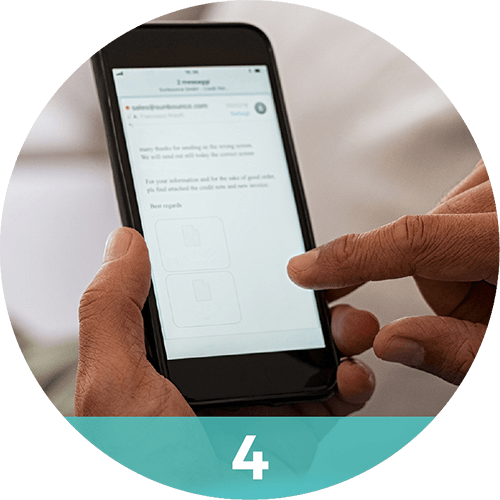
Receive confidential results in your secure online portal the moment that testing is completed.
Activate your kit
Activate your test at www.genetrace.com using the activation code provided inside your kit.
Collect DNA sample
Your test kit includes everything you need to collect painless mouth swab samples in the privacy of your own home.
Mail samples to the lab
When you’re finished collecting your DNA samples, simply mail them to the lab using the prepaid shipping envelope.
Receive your results
Receive confidential results in your secure online portal within 1-2 business days after testing begins.
FAQ's
Here are the answers to the most frequently asked questions about this test.
The all-in-one home test

Related products
- Behavior & Traits
Female Infidelity Gene Test
$149.00 Add to cartDo you carry the “female infidelity” version of the AVPR1A gene?
- Behavior & Traits
Male Pair-Bonding Gene Test
$149.00 Add to cartFind out if you have the “male pair-bonding” variant of the vasopressin receptor gene.
- Behavior & Traits
Anxiety & Depression 5-HTTLPR Test
$149.00 Add to cartFind out whether you have the “grouchy gene” linked to an increased risk of anxiety and depression.

